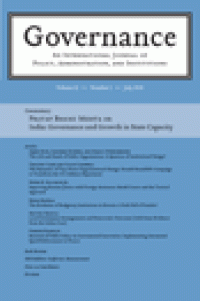
Journal Articles
Explaining Variation in the Effectiveness of Transnational Energy Partnerships
This article analyzes the effectiveness of transnational multi-stakeholder partnerships for sustainable development—also known as “Type II outcomes” of the 2002 World Summit on Sustainable Development—in the sustainable energy sector. We combine quantitative and qualitative research. Quantitatively, we use a database of 340 partnerships, including 46 partnerships that focus on energy. Our qualitative analysis includes case studies of five partnerships that appear as the most effective and five that are operational but only with modest degrees of effectiveness. We study two competing hypotheses. The first, rooted in institutionalism, assumes that variation in effectiveness is related to organizational structures and procedures. The competing hypothesis emphasizes the power of actors and expects partnerships that involve key business actors and powerful Northern states to perform better. We conclude that the level of institutionalization is most important in explaining effectiveness, while powerful partners and the type of internal organization may further enhance effectiveness.
Availability
No copy data
Detail Information
- Series Title
-
Governance
- Call Number
-
-
- Publisher
- Hoboken, United States : Wiley-Blackwell., 2011
- Collation
-
-
- Language
-
English
- ISBN/ISSN
-
09521895
- Classification
-
-
- Content Type
-
-
- Media Type
-
-
- Carrier Type
-
-
- Edition
-
Volume 24, Issue 4, October 2011, pages 713–736
- Subject(s)
- Specific Detail Info
-
-
- Statement of Responsibility
-
-
Other version/related
No other version available
File Attachment
Comments
You must be logged in to post a comment
 Computer Science, Information & General Works
Computer Science, Information & General Works  Philosophy & Psychology
Philosophy & Psychology  Religion
Religion  Social Sciences
Social Sciences  Language
Language  Pure Science
Pure Science  Applied Sciences
Applied Sciences  Art & Recreation
Art & Recreation  Literature
Literature  History & Geography
History & Geography